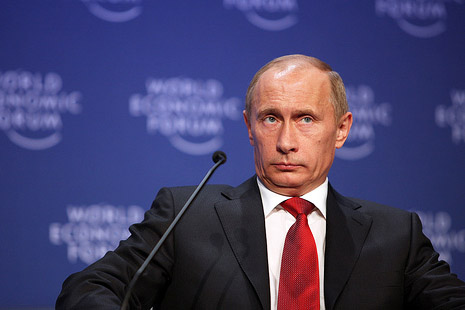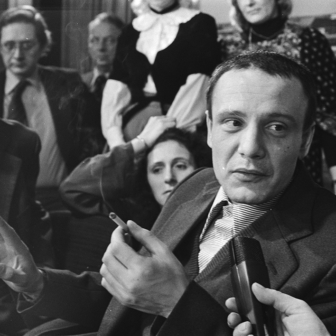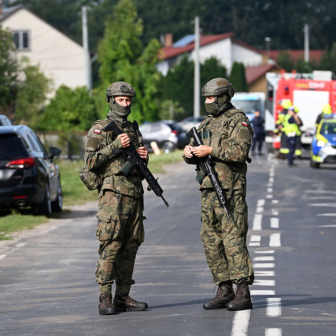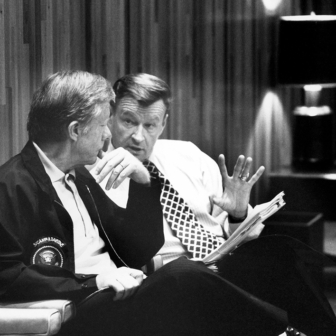BOTH before and since the poor showing of the ruling United Russia party in the December 2011 parliamentary elections, there have been commentators who expected to see Putin return as a reformist for his third term as president. Some looked back to the first-term Putin, who surrounded himself with competent economic officials like German Gref (economic development and trade minister) and Alexei Kudrin (finance minister), and introduced a few sensible economic reforms. Some looked back further, to the 1990s, when Putin’s boss was the reformist mayor of St Petersburg (and his former university law professor) Anatoly Sobchak, who reportedly inspired in him a deep respect for the law – a kind of counterpoint to his KGB training.
With high oil and gas export prices delivering fewer windfall benefits, and years of high budgetary outlays weighing heavily on the budget, it has also been suggested that in his third term Putin will have little choice but to be an economic reformer. Moreover, with popular dissatisfaction growing and his and the regime’s opinion poll ratings in decline, some maintained he would need to introduce liberal economic reforms to stave off impending Brezhnevian stagnation (zastoi) and secure his place in Russian history. With liberals in the establishment also calling for such reforms, it was argued that Putin would need to ensure, as the chairman of the regime factions, that such views were reflected in decision-making.
Some observers have discounted the sharply anti-Western tone of Putin’s second term as president from 2004 to 2008 as an understandable reaction to the West’s failure to respect Russia’s sovereignty. NATO and EU leaders, it was felt, should have rejected the desperate efforts of former Soviet vassals in Eastern Europe to join their organisations. This line of analysis sometimes acknowledges that the Obama administration’s “reset” of US–Russian relations has created a more stable bilateral and environment, in which Putin finds it less necessary to defend Russia from external meddling.
There is a subset of this school of thought, however, which is disappointed by Obama’s policies towards Russia, seeing Washington as having lost yet another of the opportunities since the late 1980s to establish cordial and cooperative relations with Moscow. Prominent among them are the distinguished historian Stephen Cohen and a group of thinkers associated with the influential Washington journal, the National Interest. While their bottom line is usually summarised in modest formulations like “all Russia is really asking for is to be treated with respect as an equal partner,” after two Bush administrations and two Democrats in the White House it begins to seem that their policy advice may never be sufficiently heeded.
Most of these critics focus primarily on the hypocrisy and unrealism of Western policy towards Russia, which they see as far more aggressive and misplaced than Russia’s towards the West. As for Moscow’s domestic policies, their view is typically that Putin’s Russia is a vast improvement on Yeltsin’s, and that Western critiques of Putinism are selective, unfair and a reflection of the cold-war attitudes their exponents are still unable to shed.
Both those who predict Putin will return a born-again reformer and those who say he deserves a better press and warmer response from his Western counterparts seem likely to be disappointed by his third term. It is doubtful that Putin will make the domestic changes that would validate more optimistic views. And the pessimists who have waited so long for better Western policies probably won’t be too surprised to see Obama II (to say nothing of any Romney I) letting them down again.
Yet March has actually seen some positive signs for the troubled US–Russian reset. Addressing a Congressional committee this month, a senior US Defense Department official foreshadowed that the United States might share sensitive data about its European ballistic missile defence shield in an effort to reassure Russia that it could not possibly threaten its nuclear deterrent.
In addition, the Russian press has reported that Obama unexpectedly changed the venue for the forthcoming G8 meeting on 18 May from Chicago to Camp David. This would enable Putin to attend the G8, then give the NATO summit a miss without its being too conspicuous. The change of venue may seem like a modest concession, and almost any concession on the missile defence shield is unlikely to satisfy Russia, which has been clinging to its grievances in the matter with remarkable tenacity.
More recently the world has overheard Barack Obama at the Seoul nuclear summit on 26 March asking Medvedev to pass on to president-elect Putin a request for a little bit of bilateral understanding. Unaware the microphone was still live, Obama requested that Medvedev let Putin know he hoped to be able to offer Russia some greater flexibility on the missile defence shield once the US presidential elections were out of the way. Medvedev can he heard assuring Obama that he would pass the message on to “Vladimir.” This microphone mishap instantly became an election issue in the United States, which may now make for further bilateral difficulties.
In the meantime, though, some earlier positive signals must have been favourably received in Moscow. On 14 March, foreign minister Sergey Lavrov announced that the Russian government would consider allowing US and coalition forces to use an air base near Lenin’s home town of Ulyanovsk to transit troops and supplies into Afghanistan. Lavrov sought to reassure offended patriots in the Duma that this was an investment in Russia’s own security against terrorists and illegal drugs coming in from the south.
This is a valid argument, but not one that would appeal greatly to many Russians in either official or unofficial circles. Resupply to Afghanistan, one of the fruits of the reset, has been permitted through Russia since 2009, but this would be the first time use of a Russian facility has been offered to NATO in this way. That such an outrage might be perpetrated in a town named after Lenin will strike many Russians as sacrilegious.
These gestures are all the more noteworthy because they followed months in which Putin repeatedly denounced the West and especially the United States for interfering in Russia’s elections and undermining stability more generally. Along with other Kremlin figures he described street protesters as traitors in the pay of the US State Department and Hillary Clinton.
Clinton and other Western officials had been critical of the conduct of the Duma elections in December, and milder reservations were also expressed about the presidential elections on 4 March by some official outsiders, including the electoral observer team from the Organization for Security and Co-operation in Europe. But Clinton, to the dismay of the Russian opposition, acknowledged that Putin was the “clear winner” this time around. The European Union made a similar pronouncement. So perhaps a degree of normality is now returning to Russia’s relations with Western countries after an unusually torrid election season.
BUT any such normality is relative. The reset has been in trouble for some time. Apart from cooperation on Afghanistan and successful US efforts to secure Russia’s entry into the World Trade Organization (overcoming both Georgian objections and Russia’s own ambivalence), progress has been modest. Relations with NATO have been increasingly cool and unproductive – hence, Putin’s desire to skip the summit. And relations with the European Union are not much better; EU–Russia summits have also become strained and light on substance.
The lack of enthusiasm for the prospect of another Putin presidency was palpable throughout much of the Western world. Obama, for his part, took several days to respond to his counterpart’s “clear” victory. The most conspicuous exceptions were Putin’s close friends Gerhard Schroeder and Silvio Berlusconi. The former German chancellor Schroeder pronounced Putin still a flawless democrat, and Berlusconi skipped a planned TV appearance to visit Russia and congratulate Putin in person.
Obama seems to have poor personal chemistry with Putin, and his administration has made a policy of dealing preferentially with Medvedev, with whom relations are warmer. While there have been obvious protocol reasons for dealing with Medvedev during his period as president, Washington seemed almost to be hoping thereby to contribute to building his authority. Other Western leaderships also seemed happier dealing with the more emollient Russian president. Whatever their motivations, after Putin’s inauguration on 7 May they will be deprived of that option.
Russia’s relations with Western countries are still snagged, however, over a number of issues, including Libya and Syria, the US ballistic missile defence shield, the UN’s “responsibility to protect” doctrine and national sovereignty, Russia’s purported zone of privileged interests, energy security and Arctic resources. But Russian domestic developments and the commentary they have attracted in the West have generated much of the East–West tension since Putin’s bloody counter-insurgency in Chechnya and his dismantling of the Gorbachev–Yeltsin democratic reforms. What course Putin decides on domestically in his third term will do much to shape his relations with the West.
While he did show some liberal leanings in his first years in power, that phase in Putin’s life now seems far behind him. He may enact some pragmatic reforms to strengthen Russia’s dismal investment climate, but nothing in his election campaigning suggested he was about to restore democracy without adjectives in Russia.
Putin is not given to public displays of empathy or emotion. His glistening eyes at his victory address to the well-organised multitude in Red Square were for himself. They recall another occasion in 2000 when he was seen to shed a tear or two at the funeral of his jurisprudential guru and career facilitator, ex-mayor Sobchak. But his sentimental regard for Sobchak is evidently coming under some strain now.
Putin is widely believed to be the godfather of Sobchak’s daughter Ksenia, who has become a glamorous TV personality and prominent member of the Putin-era glitterati with a huge Twitter following. During recent months, however, she has resoundingly aligned herself with the opposition, regularly attending their rallies. Her political chat show was removed from state-controlled TV after she invited opposition leader Alexei Navalny to make an appearance. She also attracted official notice by appearing in a viral YouTube video satirising a series of TV spots recorded by prominent public figures – sometimes, reportedly, under official pressure – declaring why they intended to vote for Putin.
Ksenia has since been accused by a Kremlin-connected media outlet of attacking and taking hostage two of its reporters. She claims that she had them ejected from her restaurant because they were attempting to film her in a private conversation. But her restaurant was visited soon after by Russia’s sanitary inspectorate, headed by one Gennady Onishchenko, who has loyally fought many a trade war – involving such things as wine, mineral water and cheese – for the Kremlin against stroppy former Soviet republics and other difficult partners. The deployment of such heavy artillery suggests that the president-elect’s godfatherly patience has been fully exhausted.
INCIDENTS like these don’t suggest any major modification of the traditional Putin style of handling dissent. But there must be some doubt also about Putin’s commitment to strengthening normal market mechanisms in Russia. For much of his twelve years at the top, things have been heading in the opposite direction, towards high-level corruption, heavy concentration of ownership in inefficient parastatals controlled by political allies, a form of “corporate raiding” that amounts to mega-larceny with menaces, and a general lack of the rule of law.
As for transparency, Sergei Ivanov, a long-time colleague and ally of Putin at the KGB and more recently, has said that surveys of investment conditions like those produced by Transparency International are biased against Russia, and that Russia should therefore produce its own. Ivanov was recently named head of the presidential administration, a decision not likely to have been made by the current nominal incumbent. President Medvedev actually got the nod to keep Putin’s place warm for him in 2008 ahead of Ivanov, who had been widely seen as Putin’s most likely successor.
Most of the liberal and democratising reform proposals that have emerged in recent years have emanated not from Putin, of course, but from Medvedev. He has proposed reversing Putin’s abolition of direct elections for regional governorships, for example, and the removal of the severe restrictions he had placed on forming parties and standing for public office. But Putin quickly made it understood that he would expect selection of gubernatorial candidates to be coordinated with the president.
The Duma is now processing the relevant reform legislation on formation of parties with unusual haste, and it is expected to be signed soon while Medvedev is still in office. There are indications that it will be shaped in such a way as to produce a proliferation of parties and yet, at the same time, it will remain possible for the Kremlin to disallow parties it doesn’t like by deploying other objections against them.
Medvedev also announced a review of the Khodorkovsky case (something advocated publicly within his entourage for some time). No one who has followed Putin’s past pronouncements on this subject, however, could feel confident the review will produce results. Putin’s press secretary Dmitry Peskov probably got it right when he noted pointedly, in response to a question, that the order to review the conviction was under the competency of the current president, declining any further comment.
While many are sceptical of Medvedev’s motives, he probably sincerely believes most of the liberal sentiments he has launched into public discussion during his presidency. But one must have very grave doubts about whether he can make any of it fly.
PUTIN has reaffirmed that he will nominate Medvedev for the job of prime minister in May. This may be a gesture towards the liberal wing within the leadership group, which felt energised by the protest movement. But Putin’s own instincts lie clearly nearer the other end of the spectrum. And the satirical buffeting he has received from the opposition in the streets and on the internet is not likely to awaken the flawless democrat in him any time soon. In fact, his main motive for putting Medvedev forward is probably not any perceived need for a liberal gesture, or loyalty to the job-swap deal with his old colleague, but rather his confidence that, as prime minister, Medvedev will not challenge him any more effectively than he has ever done as president.
If liberalising change is to come to Russia under Putin, it will have to come more despite him than because of him. While economic pressures will push him towards reforms of a sort, these will probably only be pragmatic–technocratic, not political–democratic. This brings us back to the opposition. While discouraged and diminished for the moment, they are a new factor in the mix, which Putin will find it very hard to neutralise. Their spontaneous irruption from the margins to centre stage in December will be hard to completely reverse, though Putin will give it his best shot.
Their chronic ideological divisions, and the lack of an agreed, realisable program or any dominant, charismatic leader, make the opposition vulnerable to counter-attack. So does the current tendency of some of their leaders to seek confrontation on the streets in the hope of artificially maintaining the rage. Russians have a well-based fear of revolutionary ferment, something which Putin successfully played on during his election campaign. If the courageous, but not always judicious, Alexei Navalny tries to lead them on marches to the Kremlin in present circumstances, the crowds will thin out further and be easily dealt with.
Putin has a certain contempt for most of his Western counterparts. He thinks they are weak and unstrategic, and that they can be readily outmanoeuvred. He relishes the protracted economic crisis in the West and hopes that it will persist, without getting too severe, believing that this should give him the opportunity to pursue restoration of Russian influence in the post-Soviet space. But after eight years of presiding over economic success as president, Russia’s own 8 per cent downturn in GDP in 2009 reminded him of his country’s economic vulnerability. And he does recognise the need for Western investment and know-how, the key factor leading to the tepid rapprochement with the West of the past couple of years.
This being the case, Putin is unlikely to embark on a major crackdown even if or when looming economic problems trigger a renewed wave of public opposition. Despite the violence of his language under stress in recent months, he has not generally been a gratuitously violent autocrat, except in relation to the North Caucasus insurgencies. Selective repression of individuals, and attempts to curb the independent media and the internet are more likely.
To wedge the opposition, he will probably also cultivate a few pseudo-independents from the tame parties, or popular apolitical public figures, perhaps by offering them ministries of door-frames and silly walks. He may even try to co-opt some susceptible opposition figures hungering for positions of importance. Consultative bodies may be formed with fanfare. But short of bringing back his old friend and colleague Alexei Kudrin as prime minister, none of it is likely to amount to much. Kudrin is the only politician currently on the scene with not just the economic competence, but also the necessary personal and political clout, determination and standing to push Putin nearer genuine reforms. And he has given some indications of sympathy for the opposition and their political program.
Despite Russia’s huge resource endowment, high energy export prices and minimal indebtedness (a legacy of Kudrin and his colleagues’ good management), the Putinist model is heading for serious trouble. In the last five years or so, despite Kudrin, the budgetary situation has become more unstable. Where an oil price of US$28 a barrel was not so long ago sufficient to balance the Russian budget, now the figure is over $100, and rising. Kudrin has warned that even a price of $80 would precipitate a crisis. Given the risk of a worsening slowdown in Europe, its main customer, Russia’s fiscal position is potentially fragile. It was over this issue, in particular the US$650 billion defence program slated for the next few years, that Kudrin resigned.
While Russia desperately needs increased expenditure on infrastructure, health and education, money continues to be poured not just into defence and internal security, but also into high-profile extravaganzas like the Sochi Winter Olympics in 2014, the World Cup in 2018, and the APEC meeting in Vladivostok this year. Putin’s ambitious project to coax often reluctant former Soviet republics into his new Eurasian Union also threatens to be very expensive.
The election campaign has added to the fiscal overhang. It has been estimated that the campaign promises Putin made on the fly will cost the budget a further US$161 billion over his next term in office. And the economy has other severe problems. Labour productivity and the investment to GDP ratio are significantly lower than in most other comparable countries. It will be difficult, if not impossible, to restore the high growth of the early Putin years because, for demographic reasons, the labour force will be shrinking sharply over the next few years while other key demographic indicators – the dependency ratio, for instance – will continue to deteriorate markedly into the future. It can be doubted whether Putin III will be equal to all these challenges.
It seems therefore highly likely that economic troubles will trigger renewed unrest at some point in Putin’s term, possibly even as early as mid-year 2012 when the utility price hikes postponed until after the election season are scheduled to be introduced. In the meantime, the increasingly articulate, sophisticated and demanding urban middle classes are not going to remain passive. After the Putinist idyll of the noughties, politics could be returning to Russia. •




